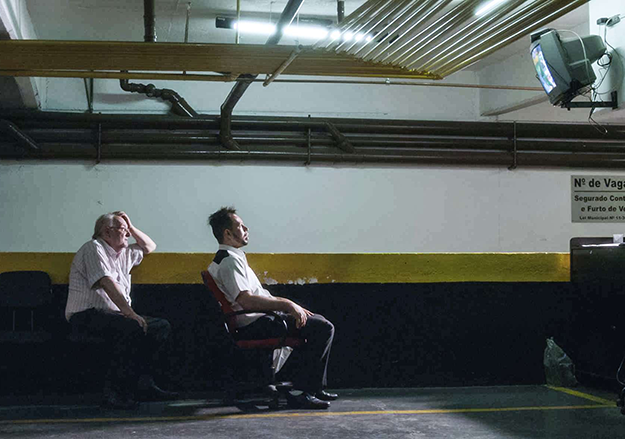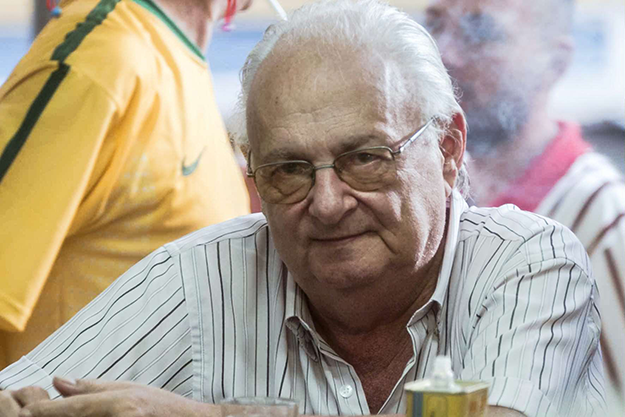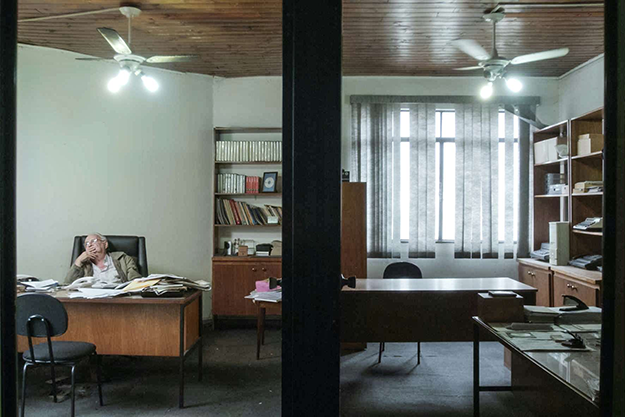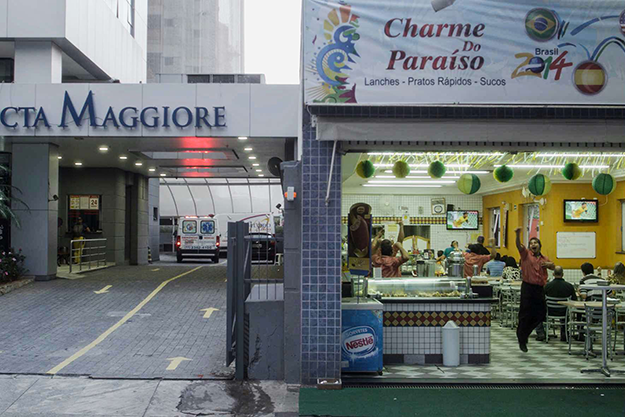Modlins began with a few bags of detritus discovered on a Madrid street containing home videos and other personal objects belonging to an expatriate American family. Its patriarch, Elmer Modlin, was a never-had-been actor whose greatest claim to fame was appearing in the Satanist party scene at the end of Rosemary’s Baby. Using the scattered information available, Oksman filled in the gaps to tell a tale of a cloistered, smotheringly mythomaniacal family unit, creating in the process a piece of poetic conjecture which is one of the more persistently eerie pieces of work that I’ve seen in recent memory. Oksman’s latest, O Futebol (“On Football”), is likewise concerned with the narrative aspect of a family. In this case the family is Oksman’s own—and yet it also isn’t, for as Oksman is quick to explain, both he and his estranged father, Simão, the central figures in his film, are playing characters. The basic material of the movie falls under the framework of documentary, and with Chantal Akerman’s No Home Movie, which examines the filmmaker’s relationship with her aged mother, and which also speaks to the Jewish expatriate experience, was one of only two docs in competition for the Golden Leopard at Locarno. Consisting mostly of their conversations in different locations, O Futebol details father and son’s time together during the 2014 World Cup in Sao Paulo. It was shot in locations that were part of Simão’s daily life: his office, from which he runs a small electronics firm on the brink of bankruptcy; the greasy cafes where he eats; and, much of the time, his car, which feels as if it may break down at any moment. So, for that matter, does Simão, who falls ill and dies during the course of the shoot, and whose disappearance is elided with an evocative understatement that is almost painfully moving. FILM COMMENT met with Oksman and Carlos Muguiro, his co-scenarist and collaborator on O Futebol, at La Magistrale, the nerve center of sorts for Locarno, shortly before their film had its world premiere in the festival.
The film gets at something that is, I think, very recognizable to a lot of men: the way in which talking about sports serves as a conduit, a way for men to manage to be together. It’s true of men in general, and it’s doubly true of fathers and sons. When did the idea of shaping a film around football matches come together for you? Sergio Oksman: Actually, I met my father in 2013 after we hadn’t talked for 20 years, and it was strange because he was a stranger. But football kept coming and going from the conversation, kept the conversation going. Our relatives, our family, were old football players, some of them dead. So this was a stick to grab onto, a way to be able to get together and avoid the big silence. So I went back to Spain where I live, and we kept talking every 15 days about football. And then two weeks before the World Cup, Carlos and I decided we wanted to make a film, although in the film we give the impression that the pact with the father to spend the Cup together had been made before that. The idea was just to spend one month together, father and son, trying to emulate father and son. Carlos, you suggested a boring film, no spectacle, just to spend and waste time together, father and son. Football had some advantages. First of all, a World Cup is very defined. It’s one month, it starts and it ends. And then we kept talking… Football also gave us the methodology, because in a way football is a rectangle, a square, divided into two opponent teams—fatality, symmetry… So this was the film we did. The point is that you don’t know what happens during a match. Carlos Muguiro: The World Cup gave us a very strong structure and some steps even to control the process. So it was like a game. I mean, nothing wrong could happen during this World Cup. But suddenly something happened. SO: Something that we think is interesting is that everything is contained in the first shot [which shows Oksman and his father posing for the camera, forced to take shelter by a sudden cloudburst]. It took us time to find the shot, which I shot one year earlier, but everything is there. Where to put the camera; the way the shot suddenly empties; the rain, something we cannot control; the two teams, the symmetry; football, which is there but it’s not there. A decision that is evident very early on is a withholding on your part, because you tell us you haven’t seen your father in 20 years. We have to infer from this that there is a strain in the relationship, but that’s all that you give us. How did you come to that decision, and had you ever considered giving more backstory? SO: First, the idea was to watch all the matches together, and to act roles, father acting like father and son acting like son. We also talked about Pedro Costa—not to try to make Vanda’s Room, but [in terms of] writing every day with my father… But when I got there, I found out my father did not care about football. He probably just wanted to get some money to pay the rent. But we had the methodology, so I said: “Let’s keep filming.” But very soon I decided to leave the shot—well actually, we decided to make wider shots, we said, “It gives the possibility to one of them to leave the shot, to walk in and out of frame” and it happens, so I just left… and along the way my father goes to the hospital… He also leaves the shot, he also leaves. CM: I think the important thing—their reunion—happened already in the past, in 2013. And we wanted only to show tediousness… SO: Boredom. No therapy. It’s not an autobiography. No therapy, no psychology. CM: It’s just a matter of spending time together. We discovered at the end that this time, this still time, this stillness, was very powerful. Although it was nothing important inside, nothing spectacular. So that was a discovery. But yes, we wanted to shoot these empty moments. SO: But it’s interesting what we also said from the beginning, who’s sitting in the backseat of my father’s car? Death, death is already there. You’re talking about dead players, dead sportscasters, there is a hole in the dashboard where before there’s a radio, and death is all the time with us in the car. It’s not just a place for the viewer to look from, but also for death, over there, waiting… That backseat vantage point is very important to the film. We get to see a lot of São Paulo’s elegant freeway system. SO: The question is always: “Why the car?” My father has a house, why not his home? Why in the car? This is an important decision. We are moving, there is not a home, or a house, or a childhood to go back to. There is a car, which keeps the symmetry, but we are not looking at my father’s shoulder, we are looking at some São Paulo that we created, this ugly São Paulo that is also a desert. There is something very important outside going on—the entire world is looking at the World Cup—but the father and the son are not invited, not to this party. Actually, when I met Simão in 2013, I was shooting in the car, and he left the car and went to the drugstore to buy something, and it was really a madeleine. It really took me back to my childhood. So the car was the space of the childhood, of the football, of the radio… CM: Yeah, from the cinematic point of view, it’s a place for the spectator, I mean. We are there watching this. Not forcing the situation—they are free to talk, giving us this frontal reverse-shot. They are free to talk without watching. SO: And then there is the shot of the wedding in the home movies. There’s also a car that pulls out there… And those home movies, which we only see once, and that rather briefly, are about as much as you give us in terms of backstory. SO: Even putting this sequence in was a big discussion, because we did not want to make therapy with film. Therapy was done in 2013 when I met him, but it’s not in the film. It’s not the film about the father and the son encountering or re-encountering after 20 years. It’s a film about wasting time together watching football, in a very strict way of shooting it. And it’s about my father, who died, which is one thing, and the father in the film, who died, which is another. We had to decide how to depict death in the film. Carlos’s father also died during the editing process. But the father, the character, this father is not my father. It’s a third person, a character.
So, the initial idea had been to have you and your father role-playing these “father-son” parts, and it’s very interesting to hear you say that, because having seen A Story for the Modlins, it very much plays with the idea of family as narrative—the degree to which a family is a kind of agreed-upon narrative that everybody acts along with. SO: It’s difficult, family in general… Actually, this film stems from another film we were trying to do, using “found footage,” archival footage from my family, my grandparents in the Fifties and Sixties. CM: [The footage was] 16mm, very excellent. SO: Excellent. You saw a bit in O Futebol—there is this trace of my grandparents. And then we gave up and said: “No.” We didn’t want to make another Modlins. And what we did next turned out to be this one. But of course, family is a construction, the father-son relationship is a construction. I think what is important here is that at the end you see my father’s crossword books, thousands of words that my father left. And we are able to construct any sentence, any father, any film. It’s incredibly moving, the images of those crossword books. Somehow the handwriting becomes ineffably moving when someone dear to you is suddenly gone. CM: Yeah… In all these words there’s maybe a hidden secret, like “Rosebud” or something like that. Something that was concealed all his life. There were so many words that Simão finally left. SO: And football for him was the same. CM: Names, names, names. SO: Hundreds of names of the people playing and dates and matches. He knew nothing of football, actually. Me neither, actually, Carlos either. I know nothing about how to analyze a team playing, but you accumulate names and names and names and names—language you can speak with your son after 40 years, at least. This movie turned into something very different than what you’d set out to make—not only in terms of your process changing, but also events beyond your control occurring during the shooting. Was there any point, after your father got sick, that you thought about just scrapping the whole thing? SO: Yes… and no. I think no, actually. Carlos and I talked while he was in Spain. CM: We had already written the ending. SO: This was very important. We had the last scene written, but before my trip to Brazil, we wrote a decalogue [i.e., a set of rules] instead of a screenplay, and in one of the sentences, we said: “This is a film about a definite farewell.” We knew in a way we had conceived this, but of course it was not like this. But… my father. My father was in the hospital, he was taken to the intensive care unit, and as a son I could spend only two half-hours every day, which I did. The rest of the day, the crew and I were sitting there, waiting. So I stayed, at least one shot every day, this was the pact, to shoot until the last day of the World Cup. Almost every day, from the first to the last match. But my father was conscious of everything—he was the co-writer of the film. There is no hidden camera, he’s absolutely aware of what we’re doing. CM: And in some ways, it’s a last gift for you, because the time finally is there, the time you haven’t in the past. SO: Yeah, for sure. Very important to the film is the idea that it occurs outside of the main event. You’re shooting in São Paulo when the most widely watched sporting event in the entire world is taking place. But while this is going on, most of the city is just going about its regular business. It seems sleepy, even. And so the main event of your film, your father’s passing, is elided. While these things happen, the world goes about its business. SO: And also the 7–1 match, when Germany destroyed Brazil—for us it was very important, and although it really happened very close to when my father died, we wanted to separate them. We did not want an underlining for my father’s death. The Brazilian trauma and his death are different things. CM: Actually the World Cup was only on television… SO: Yeah, in São Paulo there’s no World Cup. CM: The World Cup is a kind of fiction. It belongs to television, not to the city—it’s not in the city. SO: Right, you don’t experience the sensation because it’s a creation, you don’t see it directly, and there’s no radio in my father’s car, so you cannot even hear. Some people didn’t like the shot we included of the Brazilian players right before Brazil played Germany. For us, it was important to see what the world was seeing. For one second, or for 20 seconds. Which relates to the dead players. These guys, the guys on that 2014 World Cup team, are going to be the dead players when my son is 40.
By the time that match arrives, the Cup is nearly an afterthought, increasingly shunted off into the background. SO: Until the last scene when we hear who scored. And we have some affirmation of your father’s psychic abilities. He does call the final. SO: Absolutely. But we didn’t want to underline any of these things. This film probably seems to be very loose, but no, this is the most constructed film I’ve made, much more than the The Modlins. Everything is constructed, every sentence is put just so. Not everything, but a lot. But you’re not dealing with actual written dialogue… SO: No, no, no. Some of the dialogue we shot is very similar to things we wrote, though.… CM: Maybe we have written the dialogue in the editing. SO: For sure. Editing means writing by getting together fragments of dialogue. But also you keep yourself rather honest with the editing, in that there are a lot of fixed camera shots that go on for however long they go on. That also relates to this structure that you were imposing upon yourself. How did you exactly arrive at these constraints, as opposed to another set of constraints? CM: We made a kind of script, or, as Sergio said before, a decalogue, trying to imagine all possible situations before shooting. We’re even thinking about the color of the film—the color is green and yellow—the position of the camera. We try to imagine all the possible situations, and we make kind of a decalogue for the narrative, and also for the mise en scène. Then, during the editing process, we find the most difficult moment comes with finding what is in the image—to really understand the images you have made. SO: Because we have hours and hours and hours and hours… I wonder if you could talk a little bit about the winnowing down, the editing. How much you were working from, and how you did you delegate that process? SO: We did it together, which is very difficult. CM: It’s more like having a rock band. We meet together, we talk every day, we try things… For instance, we put music in at one point, there was music by a Brazilian composer. SO: We were trying to create a Brazilian mythology. CM: We tried different things. It was a daily process. We are trying to know in the process of making it what the film we are making is. That’s why I say it’s a bit like a rock band—we’re trying things in the garage. SO: To give you an idea, you know the old sticker album [of soccer players and famous Brazilian historical personages and landmarks] that I show, which I’d worked on with my father? At one point we wanted it to be our screenplay, because everything was there. It was very powerful, this idea—we really liked the stickers, with the old players from my childhood, the politicians, the landscapes, this mythology. So we tried many ways. If you compare the shots of the film with the stickers in the album, there are so many similarities. CM: But editing, we discovered that there was kind of a shadow, a black shadow, from the beginning, kind of like death itself. From the beginning until the end, there was something strange, very weird, as if death were waiting. So death doesn’t appear suddenly. Death is in the beginning. It’s in the car. SO: When the dashboard clock stops. CM: So it’s like a shadow, it’s waiting. I mean, death is not in a hurry. It’s waiting a moment. That’s something we discovered in the images. I mean, it happened here. That’s even in the blank spaces of the scores for the games that appear before every new scene, which are never filled in— SO: You don’t have the results of the games—they’re like blank spaces in crosswords. Something very important was to empty the film, especially in the hospital, when the father, my father, enters the hospital. There’s no dialogue, you just listen to some of the announcers on TV, that’s it. Until the crossword. So you have two guys talking for 50 minutes, and then silence. When we found out that the film had to be emptied, that was when we had it.



